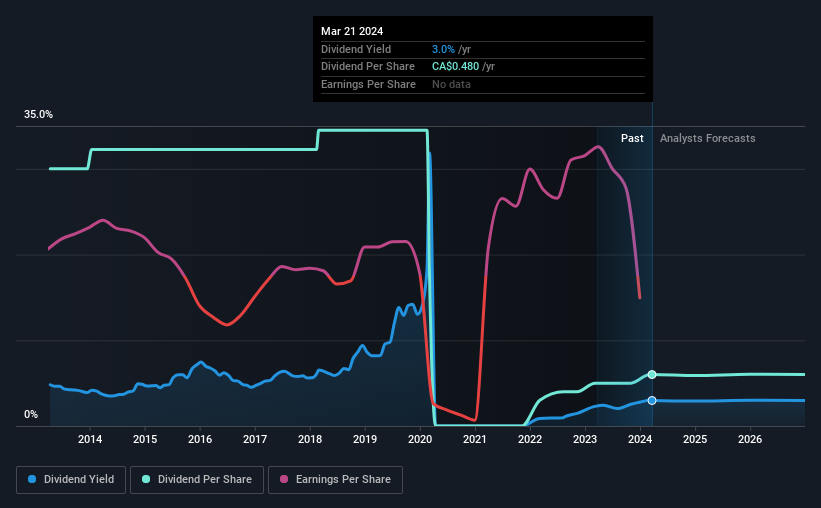Read This Before Considering Vermilion Energy Inc. (TSE:VET) For Its Upcoming CA$0.12 Dividend
Some investors rely on dividends for growing their wealth, and if you're one of those dividend sleuths, you might be intrigued to know that Vermilion Energy Inc. (TSE:VET) is about to go ex-dividend in just four days. The ex-dividend date is usually set to be one business day before the record date which is the cut-off date on which you must be present on the company's books as a shareholder in order to receive the dividend. The ex-dividend date is of consequence because whenever a stock is bought or sold, the trade takes at least two business day to settle. Therefore, if you purchase Vermilion Energy's shares on or after the 27th of March, you won't be eligible to receive the dividend, when it is paid on the 15th of April.
The company's upcoming dividend is CA$0.12 a share, following on from the last 12 months, when the company distributed a total of CA$0.40 per share to shareholders. Based on the last year's worth of payments, Vermilion Energy stock has a trailing yield of around 3.0% on the current share price of CA$16.14. We love seeing companies pay a dividend, but it's also important to be sure that laying the golden eggs isn't going to kill our golden goose! So we need to check whether the dividend payments are covered, and if earnings are growing.
See our latest analysis for Vermilion Energy
Dividends are typically paid from company earnings. If a company pays more in dividends than it earned in profit, then the dividend could be unsustainable. Vermilion Energy lost money last year, so the fact that it's paying a dividend is certainly disconcerting. There might be a good reason for this, but we'd want to look into it further before getting comfortable. Given that the company reported a loss last year, we now need to see if it generated enough free cash flow to fund the dividend. If cash earnings don't cover the dividend, the company would have to pay dividends out of cash in the bank, or by borrowing money, neither of which is long-term sustainable. The good news is it paid out just 21% of its free cash flow in the last year.
Click here to see the company's payout ratio, plus analyst estimates of its future dividends.
Have Earnings And Dividends Been Growing?
Stocks in companies that generate sustainable earnings growth often make the best dividend prospects, as it is easier to lift the dividend when earnings are rising. If business enters a downturn and the dividend is cut, the company could see its value fall precipitously. Vermilion Energy reported a loss last year, but at least the general trend suggests its income has been improving over the past five years. Even so, an unprofitable company whose business does not quickly recover is usually not a good candidate for dividend investors.
Another key way to measure a company's dividend prospects is by measuring its historical rate of dividend growth. Vermilion Energy's dividend payments per share have declined at 15% per year on average over the past 10 years, which is uninspiring.
Get our latest analysis on Vermilion Energy's balance sheet health here.
Final Takeaway
Has Vermilion Energy got what it takes to maintain its dividend payments? It's hard to get used to Vermilion Energy paying a dividend despite reporting a loss over the past year. At least the dividend was covered by free cash flow, however. In summary, it's hard to get excited about Vermilion Energy from a dividend perspective.
While it's tempting to invest in Vermilion Energy for the dividends alone, you should always be mindful of the risks involved. Case in point: We've spotted 2 warning signs for Vermilion Energy you should be aware of.
A common investing mistake is buying the first interesting stock you see. Here you can find a full list of high-yield dividend stocks.
Have feedback on this article? Concerned about the content? Get in touch with us directly. Alternatively, email editorial-team (at) simplywallst.com.
This article by Simply Wall St is general in nature. We provide commentary based on historical data and analyst forecasts only using an unbiased methodology and our articles are not intended to be financial advice. It does not constitute a recommendation to buy or sell any stock, and does not take account of your objectives, or your financial situation. We aim to bring you long-term focused analysis driven by fundamental data. Note that our analysis may not factor in the latest price-sensitive company announcements or qualitative material. Simply Wall St has no position in any stocks mentioned.

